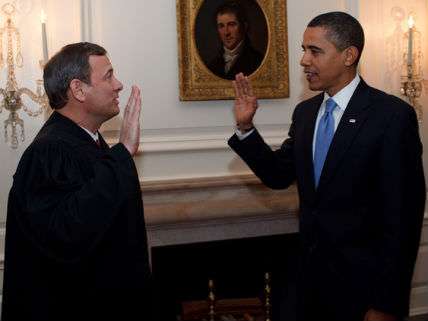Conservatives vs. John Roberts
The chief justice draws fire from the legal right.

In August 2011 I wrote a column for Reason.com arguing that when the Patient Protection and Affordable Care Act finally landed before the U.S. Supreme Court, Chief Justice John Roberts would be the vote to watch. Roberts was an old-school legal conservative, I argued, which meant that he was a true believer in the doctrine of judicial restraint, which is the idea that the courts should defer to the wishes of the democratically accountable branches of government whenever possible. That philosophy once occupied the commanding heights of the conservative legal movement, I noted, though in recent years the shine was fading and conservatives were becoming increasingly interested in seeing the courts act in a more aggressive manner. What that meant for Obamacare, I predicted, was that "Roberts may very well uphold the health care law as an act of judicial restraint. Just don't expect the conservative rank and file to thank him for it."
Ten months later, the chief justice did precisely that. "It is not our job," Roberts wrote in National Federation of Independent Business v. Sebelius, "to protect the people from the consequences of their political choices." Roberts upheld Obamacare, and he did so using the explicit language of conservative judicial deference. Few conservatives thanked him for it.
That drama largely repeated itself this past June when Roberts once again saved Obamacare from legal destruction. "In every case," Roberts wrote for the majority in King v. Burwell, "we must respect the role of the legislature, and take care not to undo what it has done."
It now appears that some conservatives have finally had enough. Writing today at the Los Angeles Times, reporter David Savage notes:
[A]s Roberts this week marks the 10th anniversary of becoming chief justice, he finds himself in the crosshairs of right-leaning pundits and GOP presidential hopefuls who brand him a disappointment and openly question his conservative credentials…
the Judicial Crisis Network, a small conservative group, began an ad campaign this month saying, "We can't afford more surprises," and featuring photos of Roberts along with Justice Anthony M. Kennedy and retired Justice David H. Souter, two Republican appointees whose decisions deeply disappointed and angered conservatives.
So what should these angry and disappointed conservatives do? Actually, here's a better question: Let's say a Republican is elected president in 2016 and has the opportunity to fill one or more Supreme Court vacancies in the coming years. How should that president avoid placing another Roberts on the bench? I'm not sure what the Judicial Crisis Network think about that, but in a recent Weekly Standard piece, libertarian law professors Randy Barnett and Josh Blackman offered some excellent advice:
Reject clichéd calls for 'judicial restraint'
"Judicial restraint" and "deference to the legislature" are easily manipulable concepts that distract attention from what really should matter to any constitutionally conservative voter or president: Who has the fortitude to follow the Constitution wherever it may lead and let the chips fall where they may? Any judicial nominee can claim he or she will be "restrained" or "deferential" but what exactly do they think "restrains" them? The popularly elected Congress, or the popularly enacted Constitution? Invocations of "restraint" and "deference" are designed to avoid this crucial issue. The same goes for deference to the executive and its administrative agencies.
Presidential candidates should reject the vapid labels of "restraint" and "legislating from the bench" and focus instead on what a prospective nominee's proven track record and paper trail (see above) say about his or her constitutional philosophy. The heart of the inquiry should be whether the nominee is willing to engage and enforce the Constitution against the other branches, not whether they can parrot clichés about "strict constructionism" or "calling balls and strikes" during a confirmation hearing.
Related: John Roberts' Judicial Abdication


Show Comments (58)